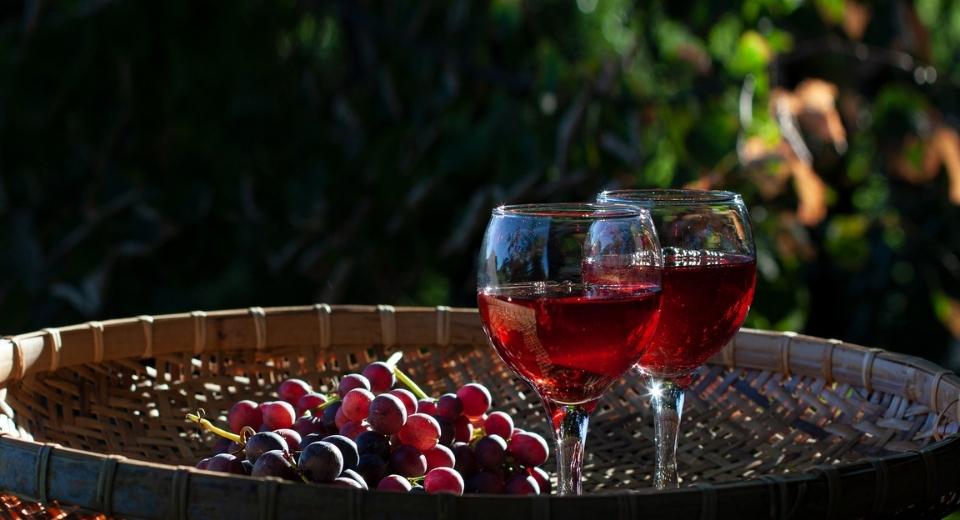Jump to:
Organic wine has been a trending topic over the past few years, and many well-established producers are transitioning toward 100 percent organic winemaking practices.
There are a growing number of organic red wine brands entering the market every year, as the demand for high-quality red wine produced without chemicals has increased as customers worldwide have grown wary of synthetic pesticides and fertilizers.
While there are thousands of different organic bottles of red wine available on the market today, there are a handful of popular labels that are considered by many wine enthusiasts to be of the highest quality.
Organic Wine Overview
Pesticides
The use of pesticides is an extremely common practice in the world of agriculture, as fruits and vegetables being produced are vulnerable to pests and insects before cultivation.
Pesticides are most often applied by spraying directly onto the surface of the plants to keep these pests away.
Throughout history, humans have used natural pesticides like neem and peppermint oil to keep insects and pests off of plants. These naturally derived oils are strong and pungent enough to keep bugs away from plants, without affecting the taste of the plants being grown.
In recent decades, the rise of mass farming has led to a number of changes in pesticide technology and chemicals. Pesticides containing harmful chemicals became commonplace, as they are affordable and very effective at keeping crops pest free.
While these newer chemical-based pesticides are effective at keeping pests at bay, they are also harmful to humans if ingested. While washing pesticide-treated vegetables before consumption is key, it is not possible to remove all traces of the chemicals from the crops.
Some people are fine with an acceptable level of pesticides in their agriculture and choose to reference government regulations in terms of what is allowable on their fruits and vegetables. Others prefer to avoid pesticides entirely, and only eat produce that is grown without chemicals.
Choosing wine that is labeled as either “Organic” or “Made With Organic Grapes” is the best way to make sure that you are avoiding chemical-based synthetic pesticides while still enjoying a quality bottle of red wine.
Fertilizers

The use of synthetic fertilizer is another contentious topic within the health and agriculture community, and many wine enthusiasts prefer to drink wines that are produced only with organic materials as fertilizer.
Along with health concerns associated with produce nourished by synthetic chemicals, there is an environmental concern associated with synthetic fertilizers as well. Runoff from synthetic fertilizers and pesticides causes great damage to the habitats of local bodies of water.
For thousands of years, humans used organic fertilizer materials such as manure, compost, and mulch to nourish plants, and all these materials are certified organic today.
Some of the best wineries in the world have never veered from these traditional methods over centuries.
Organic Wine Labeling

There are a number of different terms and designations when it comes to natural winemaking techniques, and understanding the difference between each label is a great way to establish a firmer understanding of the correct wine to purchase under different circumstances.
One of the most common and easily recognizable of these designations can be found on qualifying wines produced in the US. The USDA Organic label is displayed on bottles of American wine that are made using organic methods and products without the use of chemicals.
Another common label on naturally produced bottles of wine is the term “Biodynamic Wine”. This is different from organic wine, though wines produced using biodynamic farming techniques are nearly always considered organic as well.
While the term “Organic” refers to something that is made without the use of synthetic chemicals, the term “Biodynamic” refers to far more than the product itself. Everything from harvesting during the correct moon cycles to responsible farming is covered in biodynamic farming.
The term “Sustainable Wine” refers to the practices involved and choices made by the winemaker in terms of environmental impact and sustainability. Sustainable wines are also nearly always organic due to the fact that harmful chemicals can not be considered sustainable.
Five of the World’s Best Organic Red Wine Brands
There is a large selection of organic wine on the market today, and a number of the top wine producers in the world have shifted to sustainable and organic winemaking practices over the past decade.
Here are five great examples of some of the most famous organic red wines today.
Château Latour

Pros
- One of the famous Grand Cru of Bordeaux, regarded for high quality
- Extremely well-known and sought after
- Available at the top restaurants in the world
- Aged in high-quality French oak
- Widely regarded as one of the best wines in the world for hundreds of years
Cons
- Limited supply available, as it is so famous and popular
- Very high price tag will keep most wine enthusiasts away
- Not an “everyday wine,” best saved for special occasions
Château Latour is one of the most famous and recognizable bottles of wine in the entire world. This iconic Bordeaux blend is made using the world-famous Cabernet Sauvignon and Merlot grapes and has been a favorite amongst kings and royalty for centuries.
Over the past decade, this iconic French winemaker had transitioned over to organic winemaking techniques, and it is estimated that the entire estate became 100 percent organic some time between 2017 and 2019.
Château Lafite-Rothschild

Pros
- Extremely famous and highly regarded bottle of red wine
- Features the iconic Bordeaux blend of Cabernet Sauvignon and Merlot
- Available at some of the most reputable high end establishments in the world
- Takes very well to aging and can be cellar kept for many years
Cons
- One of the most expensive bottles of wine on the market
- Can be very difficult to find outside of high-end restaurants
- Often can only be found for purchase for personal collections at auction
Château Lafite-Rothschild is another extremely famous bottle of red wine that is from the Bordeaux region. This was one of the four original first growths of Bordeaux, each of which is considered to be of superior quality and were some of the first world-famous wines on earth.
The winemaking team has been using organic techniques increasingly over the past few years, and while one of the head winemakers recently commented that they have “no interest” in applying for official organic certification, they have been fully organic for over three years.
Fattoria La Ripa Chianti Classico Riserva DOCG

Pros
- Famous bottle of wine from an iconic region
- One of the top representations of the world-famous Sangiovese grape
- Prestigious DOCG designation is the highest designation awarded in Italy
Cons
- Refined style of wine is too “light” for some wine enthusiasts
- While widely distributed, not available on every wine list
Fattoria La Ripa Chianti Classico Riserva DOCG is one of the most famous and highly respected bottles of wine from the famous Chianti region of Italy. This Sangiovese-based blend is produced using 100 percent organic farming techniques.
San Polino Helichrysum
Pros
- A straightforward representation of the iconic Brunello style
- Widely distributed all around the world at retailers and restaurants
- Fairly affordable for a high-quality bottle at around $60
Cons
- The Brunello di Montalcino style is somewhat polarizing among wine enthusiasts
- Some wine enthusiasts prefer more “serious” bottles of Italian red wine
San Polino Helichrysum is produced in the world-famous Brunello di Montalcino region of Italy, and is well known for its strong and deep flavors of tobacco, oak, and black fruit. This is a great example of a winemaker in a classic region using simple traditional organic techniques.
Cooper Mountain Vineyards Pinot Noir

Pros
- Pinot Noir is one of the most popular and beloved red wine grapes in the world
- Fantastic value for a high-quality new world wine at under $35 per bottle
- Multiple scores in the high 80s from established wine critics
Cons
- Some wine enthusiasts frown on new world wines in general
- Not available on many wine lists outside of the US
Cooper Mountain Vineyards Pinot Noir is one of the best representations of organic red wine from the United States being produced today. Hailing from Oregon’s famous Willamette Valley, this delicate representation of the Pinot Noir grape is both balanced and complex.
Best Organic Red Wine Brands – Conclusion
There are a wide variety of different reasons for the recent boom in the popularity of organic red wine brands worldwide.
Many wine enthusiasts prefer to drink wines that were not produced using potentially harmful pesticides or fertilizers.
While there are many different organic red wines on the market today, Château Latour and Château Lafite-Rothschild are clearly the two best options in terms of both quality and prestige.







